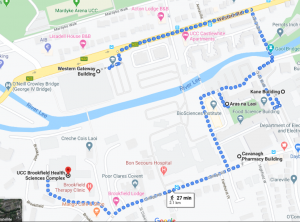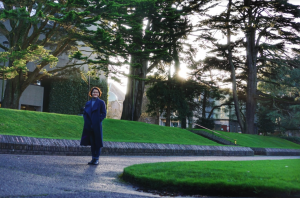‘If I had to choose one word to describe the programme, it would be “INTENSIVE”. In her final blog, Vietnamese student Tran Thi Hoang Yen tells us exactly what’s involved in her one-year Master’s in Data Science at University College Cork, which she decided to stay to complete even amidst the Covid-19 pandemic. And she has no regrets!
It’s March 24, 2020, and I am living through the most unforgettable period of my life – the Coronavirus pandemic. To date, Ireland has witnessed 1,125 cases and 6 deaths from Covid-19 after three weeks. Many international students chose to return to their home countries. It was stressful for over a week after school closure trying to decide whether or not to stay in Ireland to complete my Master’s, but while it has been a tough decision to make, I’m hopeful it is worth it.
In this last blog, I would like to share my experience of studying a 1-year Master’s programme in Data Science & Analytics at UCC. My experiences go beyond the course descriptions that you can easily find from the programme website. So, I hope it is useful for undergraduate students or perhaps high-school students before selecting a higher education programme in the Data Science field.
Intensive but practical
If I have to choose one word to describe the programme, it would be “INTENSIVE”. The programme is conducted in 1 year, with 90 credits. That means each semester you need to study 30 credits, equivalent to 5–6 modules, which doubles the amount of work compared to a normal 2-year programme. For instance, in the first semester, I had to complete 22 practical assignments, 3 written midterm tests, and 6 final exams. So, in my opinion, time management (and perhaps handwriting;)) are essential skills for you if you don’t want to be left behind. Don’t be afraid of the figure as the programme is designed in a practical manner. Thus, the more assignments you do, the more familiarity with the tools you become. It will then save a lot of time for you during the revision for final exams, which will test your knowledge of all the assignments that have been given to you.
To get around fast, get to know your surroundings
The intensity also means a tight schedule. Be prepared for going to school from Monday to Friday, from 9:00 AM to 6PM. And there’s another big consideration too. If you don’t know already, UCC has many buildings and campuses across Cork city. Some of them are close together, but some are very far apart. If you’re to study the Master’s in Data Science, be prepared to walk to three or five UCC campuses (per day) to attend all your lectures or practical sessions. My tip? Spend the first few days at the beginning of semester to find the (shortest) routes to all campuses. It’s very interesting. Don’t get lost, and don’t be late!

My route to class – can be quite circuitous! (Image: Google maps)

The Western Gateway Building – the main location of the program
Flexibility brings advantage
What I like about this Master’s is the flexibility. The programme combines statistical modules like Operation Research and Generalized Linear Model, with Computer Science modules such as Python Programming, Deep Learning and Data Mining. Besides some compulsory modules, it allows students to select modules that they are more interested in. Thus, students with different backgrounds can adapt their programme to suit their needs. This is an advantage compared to the fixed-curriculum style in other universities. Even though the programme is designed to fit with various backgrounds, I think it will be particularly beneficial if students have working experiences and background knowledge relating to programming languages like R, Python, statistics like probability, linear regression and Mathematics like linear algebra.
Better to be prepared
For those whose backgrounds are not related to computer science or statistics, preparation could be done from various (free) online courses, bootcamps or seminars. Of course, there are revision or introduction sessions at the beginning of each module, but there are a lot of practical assignments and later assignments grow in complexity. So if you are not prepared or experienced, it might be difficult to catch up with the pace of lectures. If you are well prepared, on the other hand, it will save time when it comes to completing assignments. This also means you have more opportunity for in-depth discussions or research with your professors.

Me in the main campus of UCC. FYI, UCC is the only Irish university to feature in the top ten list of the world’s greenest universities
Aim for the best
One notable challenge of this programme is that students need to achieve at least 60% GPA after two semesters to be eligible for conducting summer project or graduation thesis. If not, you only receive a High Diploma certificate. I find this requirement a tough condition as I am not familiar with the grading system and evaluation in Ireland. And many of my classmates have felt the same. So, my advice is to always try to achieve the best mark for each module that you can, even though the module is not your strength. Every decimal point is counted! Don’t give up.
I hope this post helps you to imagine more clearly the programme you are going to pursue. Wish you all health and success in your choice. I am looking forward to a glorious return to school soon!

